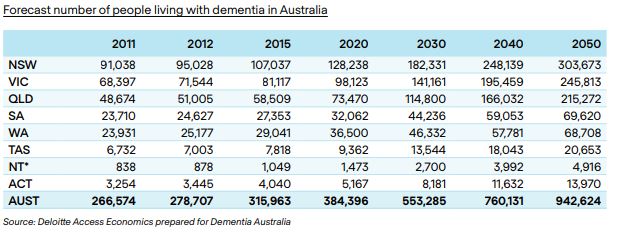
Councils need to develop dementia strategies to prepare for a projected increase in people living with the condition and build communities that meet their needs, a report by an independent think tanks says.
The Committee for Sydney report, released on Thursday, says “it is not enough to have a public policy strategy to deal with the ageing population that doesn’t consider the challenge of rising rates of dementia”.
It says the number of NSW residents living with dementia is expected to hit 300,000 by 2050, while in Victoria the figure will be around 195,500.
As a nation Australia will have close to one million people with dementia by that time.
Local councils need to begin working on strategies to help manage the coming demographic shift in ways that are tailored to their local urban environment, the report says.
“Our urban form and design must consider the needs of people with dementia, and … planning for dementia is an area that all local areas will need to put more effort into.”

This doesn’t mean just thinking about street design, local planning and social services, but also ensuring adequate housing for people with dementia, with the number of people with dementia living in public housing forecast to grow to 31,670 by 2050.
Meanwhile, measures are needed to enable people with dementia to remain at home, including the provision of more home care packages and re-evaluating the dementia home care supplement.
Councils leading the way
The report points to Hornsby Shire Council, which has a dementia rate of 2.4 per cent higher than the NSW average, and in 2018 announced a dementia policy including a plan to become Sydney’s first dementia-friendly community.
A spokesman for Hornsby Shire said council was committed to creating a place where people living with dementia had access to all the support they needed.
“Having dementia should be no barrier to a person being fully connected to their community,” he said.
“Council is currently exploring a range of initiatives, while also making contact with various service providers and support groups.”
Meanwhile the University of Wollongong is working with Kiama Council on the NSW south coast to develop the award-winning Dementia Friendly Kiama Project.
“Other local councils across NSW should examine both the Kiama and Hornsby initiatives and develop their own tailored strategies to deal with the growing number of residents within their own community which are living with dementia,” the report says.
Councils in Sydney and Brisbane have also recently released plans to make their cities more friendly and inclusive for people with disability, including those with age-related disability.
Logan City Council launched its four-year Access and Inclusion Plan on May 7, with over 80 actions aimed at making life better for residents with a disability.
Sydney City Council is also revamping its disability policies with guidelines around kerb ramps, accessible public toilets, picnic settings and playgrounds. It has also prepared guidelines to ensure community gardens, footpath gardens and activities such as markets are inclusive and accessible.
The City’s draft inclusive and accessible public domain policy, part its four-year City for All: Inclusion Action Plan, is aimed at addressing inequalities faced by people with disabilities, but the strategies will also improve access for elderly people and families.
Exodus of the aged
The report says Sydney is also woefully unprepared to meet the needs of older residents and faces an exodus from some suburbs because of a lack of facilities.
It says housing, transport and access to healthcare is inadequate to meet the need of the city’s ageing population.
According to polling undertaken for the committee by Ipsos, fifty per cent of Sydneysiders think that their suburb does not currently cater well for the needs of seniors and retirees. Of those, over half expect to leave their area in retirement.
The figures also indicate public services may have to support up to a third of Sydneysiders in retirement.
The report, Dignity and Choice: an inclusive future for our ageing population, found:
- Less than one per cent of the private rental market is affordable for full pensioners
- Over one million people in Sydney’s outer suburbs have access to public transport, many of whom are older residents
- A third of older people experience loneliness and isolation
- Councils are failing to develop dementia strategies
- Planning and tax disincentives for older people to downsize is locking up the supply of multi-bedroom dwellings
It recommends:
- Expanding affordable and social housing for retirees
- Reforming tenancy laws to make home modification easier for retirees
- Reforming tax law to make it easier for retirees to downsize or more into retirement homes
- Expand public transport in areas which higher numbers of people aged over 70 and adopt more on-demand services
- Invest in social infrastructure and community events to reduce social isolation
- Make streets more accessible for people with dementia
A version of this story also appears in Community Care Review
Comment below to have your say on this story.
If you have a news story or tip-off, get in touch at editorial@governmentnews.com.au.
Sign up to the Government News newsletter.
Thanks. Important issue. Everybody matters.
Could not agree more but it is very complex. Royal Commission report into the Aged may help somewhat